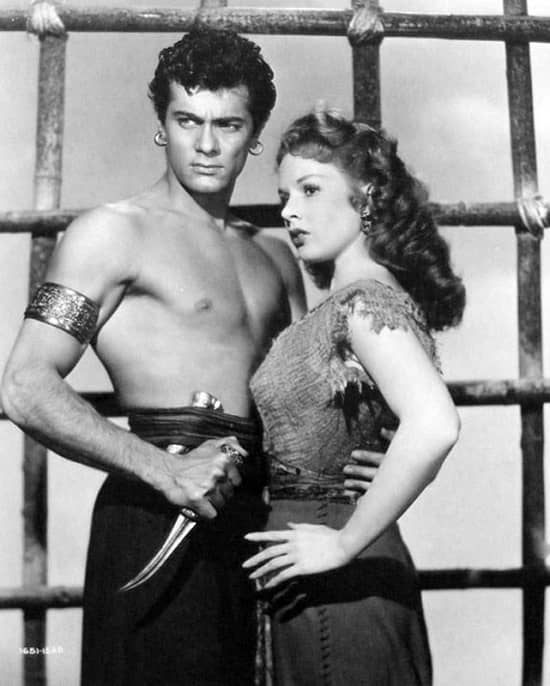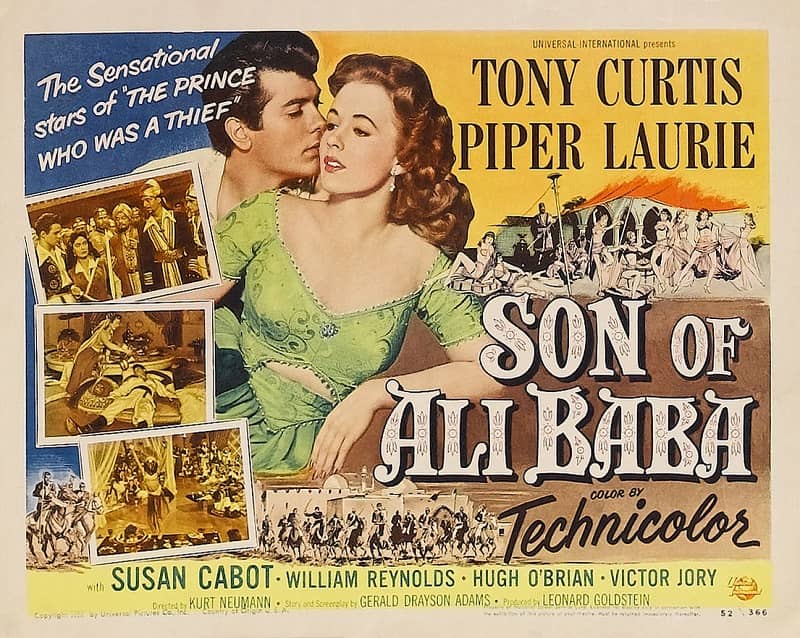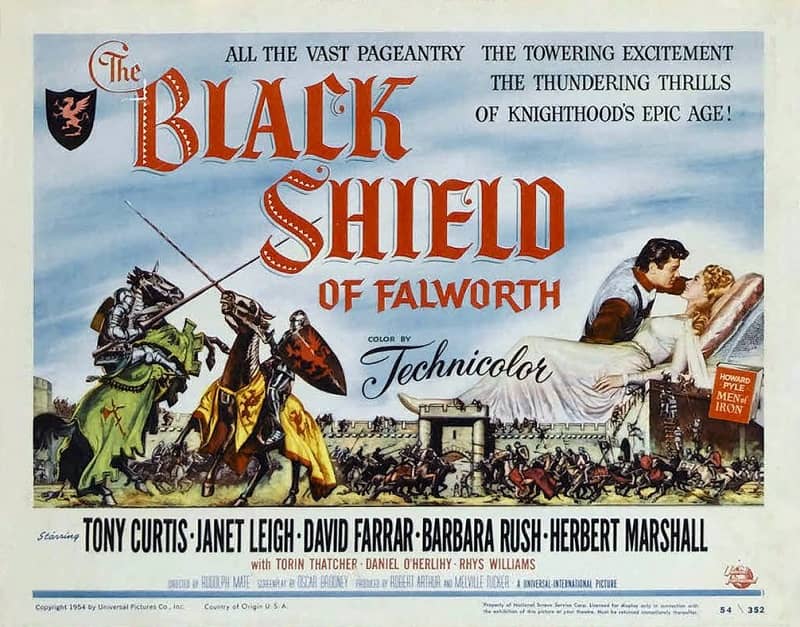Ellsworth’s Cinema of Swords: Tony Curtis Goes Yonda
Tony Curtis and Piper Laurie in The Prince Who Was a Thief (1951)
In the early Fifties, Tony Curtis was still honing his skills as an actor, but he was good-looking, athletic, and gosh, people liked him, so Universal decided to make him a star. Fortunately for us, for his first two swashbucklers Universal paired him with Piper Laurie, who was even more good-looking, athletic, and likeable than Curtis. And knowing that by the late Fifties Curtis would become a pretty decent actor, it’s interesting to watch him develop over his first few features.
The Prince Who was a Thief
Rating: ***
Origin: USA, 1951
Director: Rudolph Maté
Source: ATI Entertainment DVD
This is the first of many sword-swinging starring roles for Tony Curtis, whom you really can’t avoid if you’re watching historical adventures made in the Fifties. Everybody mocks Curtis, and it’s somewhat deserved, since he didn’t have the smarts of a Burt Lancaster or even a Louis Hayward, but he wasn’t terrible so much as mediocre. Somebody was persuaded that he was movie star material, but it took Hollywood about ten years to figure out that he was best employed as a reliable second banana. Fortunately, he’s offset in this film by engaging performances from Everett Sloane and Piper Laurie, who even this early in her career knew exactly what she was doing.
As he had in The Prince of Foxes, Sloane excels at playing a thief and assassin, though here he does so with a comic touch he didn’t get to show in the earlier film. Hired to kill the infant Dey of Tangier so the child’s wicked uncle can assume the throne, when the time comes he can’t do it, so he fakes the murder and takes the child to raise as his own. As in all tales of a rightful monarch raised in obscurity, we know how it’s going to end, so the pleasures or disappointments come in getting from here to there, and this time the trip is mostly worthwhile.
The boy grows up to become Julna (Tony Curtis), the city’s greatest thief, who is fixated on its greatest prize, the treasury vault where the false dey stores the gold his tax collectors wrest from the people. The business of thieving gets a proper workout in this movie, and Julna’s exploits evoke the young Conan the Barbarian or a Dungeons & Dragons rogue. The whole thing is shot on soundstages, with no exteriors at all, just the ever-dark city streets and the moody lamp-lit interiors that surround and tower over them.
In proper Thief of Bagdad fashion, while escaping some guards Julna goes where he shouldn’t and casts his eyes on forbidden fruit, his beautiful cousin the Princess Yasmin (Peggie Castle). The thief is smitten with the snotty princess, but as soon as he cute-meets another thief, Tina (Piper Laurie), during a bungled jewel robbery, we know she’s really the one for him. The barely legal Laurie, as slippery as an eel and as cute as two bugs, is a wide-eyed naïf who speaks of herself in the third person like an Elder Scrolls Khajiit and is just as adorably avaricious. Lissome and energetic, she effortlessly matches Curtis’s considerable athleticism, usually while squealing with glee. She’s a delight.
Though based on a story by Theodore Dreiser, of all people, the plot is standard-issue claptrap, with mistaken identities, intrigue in the dey’s court, and an egg-sized pearl the possession of which is the key to marrying the snotty princess. There are several unnecessary scenes of “oriental” dancing by scantily clad women, but to be fair there’s also a lot of gratuitous swimming by the bare-chested Curtis. The thefts and pursuits are interspersed with gags, but about half of them fall flat, often because they rely on lines such as, “Begone, you sons of she-camels!” Sad stuff, but the scene where the thieves use geese as projectiles is charming. After many such hijinks, Julna is revealed as the Rightful Dey — he has a tattoo and a scar, to make doubly sure — the snotty princess is packed off, and Tina is forced to take a bath so she can be properly married. Ending with a marriage: in classical terms, that’s what makes it a comedy, right?
Son of Ali Baba
Rating: **
Origin: USA, 1952
Director: Kurt Neumann
Source: Universal Vault DVD
Universal decided to do another Arabian Nights-style adventure starring Tony Curtis and Piper Laurie, but this time they got a dud. Thanks to the vast wealth of his father Ali, a former thief, Kashma Baba (Curtis) is enrolled with the sons of the nobility as a cadet in Bagdad’s Military Academy — which, except for the dark Curtis, is entirely filled with WASP-looking frat boys straight from the country club. (As usual for Hollywood of this era, only merchants, thieves, and the caliph’s goons look like actual Persians or Arabs.) Kashma throws himself a rowdy birthday party in his opulent Bagdad house in which the caliph’s boorish son gets thrown into Kashma’s indoor pool. Uh oh! Vengeance is sworn by the caliph and his son, and the next morning Kashma is embroiled in a plot to ruin him and his father by foisting upon him an escaped slave girl named Kiki (Laurie), only she’s really a princess who’s been promised to the shah unless she can find Ali Baba’s treasure for the caliph in time to save her mother but it’s impossible to care because this thing is a mess, okay?
I always hate to blame the writers, they’ve got it hard enough, but in this case I feel obliged to point the finger of shame at Gerald Drayson Adams, who concocted this goofy story and wrote all the terrible, terrible dialogue. There’s a definite high style to the classic Arabian Nights stories and adapting that poetic diction to a movie script can be done and done well, but based on this clunker Adams had no idea where to begin. These poor actors are only human, and no one can say a line like, “I sense an evil hand has wrought this chain of circumstances!” without looking at least a little embarrassed. Poor Tony Curtis has it the worst, having to utter junk like, “Perished I would have, had not the princess dragged me from the flames,” all with a pronounced Noo Yawk accent. Yeesh.
The only real point of interest in this otherwise dull and derivative exercise is the character of Tala (Susan Cabot), a bow-wielding huntress and friend of Kashma’s youth. At first it seems her only purpose is to make Princess Piper jealous of her friendship with Kashma, but then she saves the day several times in succession with her deadly archery talents. Tala is intriguing and capable, and how she wandered into this fiasco is anybody’s guess. The role should probably have been combined with the princess’s so Laurie would have something to do other than look ornamental, because as it stands, her considerable talents are wasted. Watch The Prince Who was a Thief a second time instead.
The Black Shield of Falworth
Rating: ***
Origin: USA, 1954
Director: Rudolph Maté
Source: Amazon streaming video
The Victorian children’s novel Men of Iron (1891) by the American author and artist Howard Pyle had a big influence on the “knights in shining armor” medieval adventure tales that were popular right up through the 1950s. Pyle’s story was a simple morality play in which Myles, a young Englishman whose father was betrayed by an ambitious noble, trains as a squire and then as a knight, finally avenging his father’s betrayal. Pyle’s vivid depiction of would-be knights training with sword, shield, armor, and lance was recycled countless times in tales of medieval chivalry over the following three-quarters of a century. Men of Iron also established in popular fiction the convention of trial by combat (“And may God defend the right!”), the favorite climactic plot device of the lazy knight-pulp writer.
All of these tropes are on display in classic fashion in Falworth, Universal’s adaptation of Men of Iron. Concocted as a starring vehicle for Tony Curtis, here in his first big-budget epic, Pyle’s simple tale is simplified even further for the screen, while its romance aspect is fleshed out to provide additional screen time for the radiant Janet Leigh, Curtis’s then-wife, in the role of the female romantic lead, Lady Anne. Curtis’s nimble athleticism serves him well in the part of the hot-headed and energetic Myles, though when reading his lines his delivery is still rather awkward. It doesn’t help that a lot of the dialogue is in the highfalutin elevated diction that had been considered appropriate for tales of medieval chivalry ever since Sir Walter Scott, stuff like, “Have you not had your fill of buffoonery?”, but thankfully it’s toned down considerably from the stilted language in Pyle’s novel.
The guy who gets the best lines is Torin Thatcher — you know him as the sorcerer in 7th Voyage of Sinbad — appearing here as Sir James, the surly one-eyed master-of-arms-cum-drill-sergeant who trains Myles in the knightly martial arts. Thatcher’s is easily the film’s most enjoyable performance, clichéd though it may be, and when he threatens to hurl Myles from the battlements if he gets into just one more brawl, you believe him.
Falworth was Universal’s first Cinemascope extravaganza, and no expense was spared on the colorful costumes and expansive sets, with absurdly spacious castle interiors and grand courtyards where platoons of men-at-arms ply their medieval weaponry. The romance story is familiar and the villains’ plots are all too predictable, but the fight scenes are tight and well-choreographed, the film is a pleasure to look at, and it doesn’t pretend to be anything but a simple tale of pluck and virtue triumphant over mean-spirited wickedness. (Oh, and by the way, persistent movie myth notwithstanding, in this film Curtis never says,”Yonda stands the castle of my fadda” — for that, see The Son of Ali Baba.)
The previous installments in the Cinema of Swords are:
Olivia de Havilland — First Queen of the Swashbucklers
Goofballs in Harem Pants
Disney’s Early Swashbucklers
‘50s Vikings – Havoc in Horned Helms
Laughing Cavaliers
Charming and Dangerous: Douglas Fairbanks, Jr.
Eleven Samurai: Early Chambara Classics
Beyond Captain Blood: Three by Sabatini
3 Musketeers + 1 Long Nose
Louis Hayward, Everyman with a Sword (Part 1 of 2)
Days of Technicolor Knights
Louis Hayward, Everyman with a Sword (Part 2 of 2)
Laurence Olivier, Swashbuckler?
LAWRENCE ELLSWORTH is deep in his current mega-project, editing and translating new, contemporary English editions of all the works in Alexandre Dumas’s Musketeers Cycle, with the fourth volume, Blood Royal, just published by Pegasus Books in the US and UK. His website is Swashbucklingadventure.net.
Ellsworth’s secret identity is game designer LAWRENCE SCHICK, who’s been designing role-playing games since the 1970s. He now lives in Dublin, Ireland where he is co-designing a new mobile RPG for the WarDucks game studio.



I confess!
I LOVE The Black Shield of Falworth.
And there is so much to love…
The absurd 1950’s Hollywood vision of the Middle Ages.
Tony Curtis’s hyperactive performance. The guy emotes by jumping around.
Janet Leigh’s jaw-dropping gorgeousness.
The ridiculously rousing score.
Not to mention the nicely choreographed final battle between our noble hero and that snarling epitome of base knavery, The Black Knight!
Even if the rest of the flick proves too hokey for the average Cinema of Swords fan, I’d advise fast forwarding to the bit where the villain leaves his guard open and receives a pretty realistic skewering for his trouble.
Hey Lawrence, I expect you’re familiar with this You Tube channel, but the thought of you being unaware of it is intolerable…
https://www.youtube.com/channel/UCM6-0zDP-QMrbID6CljNVjw/videos
Another Cinema of Swords post? Thank God, I was bored to tears.
This time, the post looks at three of Tony Curtis’s films,two of which are well worth watching. The clunker is The Son of Ali Baba, which I remember only because of the “Yonda lies…” line and the striking Susan Cabot. I didn’t even remember that Piper Laurie was in this film until you mentioned it, and she’s a favorite of mine.
Janet Leigh was a knock-out in this film, and as Aleta in Prince Valiant, also released in 1954.
Thank you, Mr. Ellsworth.
I think you sell Bernie Schwartz…er, Tony Curtis, somewhat short. True, he didn’t convey much conviction in these films – or in a much better movie than these, Spartacus – but some actors just aren’t comfortable in costume pictures; they know they can’t bring it off.
But give Curtis a part in his range and he could be terrific, whether it was comedy (Some Like It Hot) or drama. His self-loathing, sweating-with-desperation Sydney Falco in Sweet Smell of Success is one of the great performances of the 50’s, and much more worthy of an Oscar than the actual winner, Yul Brynner.
If I could just put in a good word for THE VIKINGS (1958) which also has Kirk Douglas, Ernest Borgnine, and Janet Leigh in an anachronistic bodice (because bums in seats, laddie). Beautiful cinematography, epic action, and in a decade filled with epic scores, an epic score that can go fifteen rounds with any of them by Mario Nascimbene.
By Odin’s Eye, Mr. Knight!
It was not until this moment that I realized Mario Nascimbene not only wrote the literally unforgettable score for The Vikings, but also the insanely Epic score for Hammer’s One Million Years BC.
Thanks, John Hocking, for the SwordFightsGalore channel, I hadn’t looked at it lately!
And as for The Vikings (1958), Sir Knight, check out the ’50s Vikings installment of this very column! (Link above).